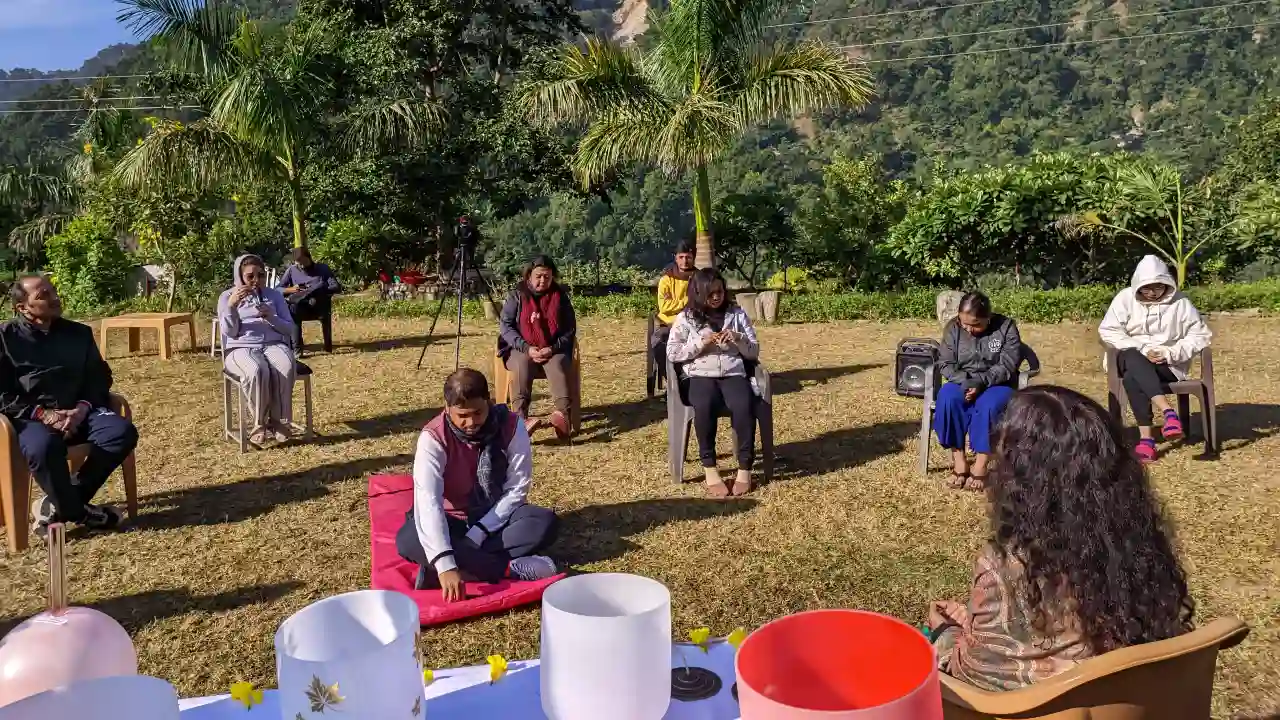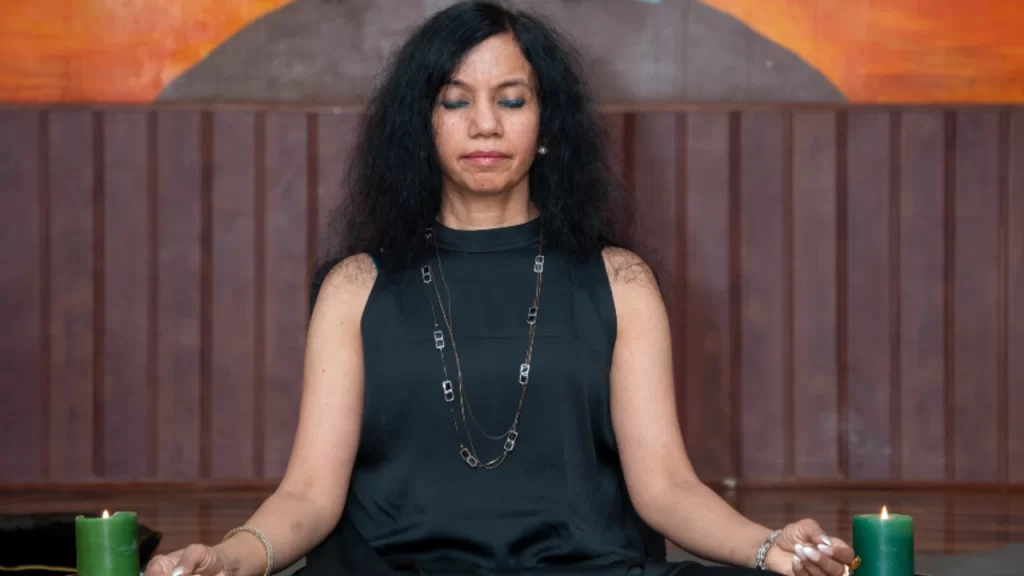Meditation is a journey toward profound levels of consciousness. Be you a beginner or an advanced practitioner, knowing the different levels of meditations helps one go deeper into their practice. In this blog, we will be looking into each level in detail, how to achieve them, and the benefits gained.
Studies reveal that 62% of people who meditate regularly experience improvements in their emotional and mental well-being, with the positive effects visible within a month of consistent practice .
The First Level: Breath Awareness and Focus (Anapana)
Traditionally, the trip would start with breath awareness, which is called Anapana. This starter level helps those new to Levels of Meditation develop their basic ability to focus on the breath, whereby the mind settles and increases concentration. Breath can prove to be a very powerful tool in Levels of Meditation; they act as an anchor that brings your awareness into the present moment. It’s observing the breath without changing it, and through that practice of breath awareness, detachment helps quiet the mind and prevent distractions that would challenge entry into a deeper state of Levels of Meditation. This phase has set up the foundation for further practices. Regular breath-focused meditation reduces stress by 43% after only eight weeks of practice.
The Second Level: Insight and Mindfulness Meditation
The second level would take people further away from breath awareness and lead them into insight meditation often referred to as Vipassana or Mindfulness Meditation. Individuals at that level begin watching their thoughts, feelings, and other interior experiences without reacting to them. Cultivating detached awareness of interior experiences, meditators begin to realize the transient nature of thoughts and emotions.
This stage is also typically a turning point for many because it develops self-awareness and emotional intelligence. The ability to observe one’s thoughts without attachment allows the practitioner to become aware of how/when thoughts and emotional triggers occur that create inner stress or pain and by so doing introduces calm. Research indicates mindfulness meditation reduces emotional reactivity by as much as 45%, enabling a response rather than reaction to stressful situations.
The Third Level: Concentration Meditation and Single-Pointed Focus
The third level of meditation practice relates to that of the mastery of what is termed Concentration Meditation, or Single-Pointed Focus Meditation. In this regard, the meditation practitioner focuses sharply on one object, sound, or picture-for example, a flame on a candle, a mantra, or an imagined point of light. This helps train the mind to focus all its attention on one point without letting go to the distraction of external stimuli or randomly wandering thoughts.
Single-pointed focus can lead to profound inner peace and mental clarity. The ability to keep an eye single towards one point for an extended period of time sharpens the mind and develops deeper stillness. The practice, over time, quiets the mental chatter, so you remain present, even in the most trying of distractions.
Studies suggest that single-pointed concentration practices enhance memory retention by 20%, and those who practice regularly report experiencing a clearer mental state .
The Fourth Level: Transcendental States and Awareness Beyond Thought
This is the fourth and last state of meditation. Practitioners attain transcendence – that is, they transcend the ordinary thought and perception. This can be called the “flow” state or attuning with the universe in one. It can bring about a deep sense of being connected to everything around, along with an intense sense of knowing the self.
Achieving this stage is not an easy, effortless task and may take decades of practice to attain it. Nevertheless, people who have reached this stage feel ecstatic, peaceful inside, and the ego is erased. Scientific research reveals that transcendental meditation reduces a person’s blood pressure by about 5-10 mm Hg in a group of practitioners, which helps maintain the total health and well-being of the body.
How to Transition Through the Different Levels of Meditations
Transitions across all the levels of meditations involve a lot of patience, consistency, and dedication. The process should not rush but should be allowed to happen step by step. Experts on meditations recommend at least 10-15 minutes of consistent daily practice and extension of time as one’s capacity for concentration develops.
For most, it will take months, or even years, fully to learn the subtleties of each level. Don’t forget, meditation is not a race but a journey of self-discovery. And as you continue the practice and exercise on a regular basis, you will see that moving from one level of meditation to another will gradually be done instinctively.
Alchemy Energy Healing and Its Role in Advanced Meditation
As you work through the levels, you’ll find that alchemy energy healing can at times support an improved meditative experience. The technique is a type of energy work that clears your energetic body, and you will often work with the chakras or your centers of energy. As you bring your energy into balance and alignment, you are thus unlocking the doors to deeper spiritual experiences as you meditate.
Alchemy energy healing frees sluggish or blocked energies that are seeking emotional healing and helps one to penetrate deeper into meditation experiences. This modality combined with more advanced forms of meditation is a transformational shift.
Life Coach India: Guidance for Meditation and Life Transitions
For those attempting to travel through the more profound stages of meditation, engaging a life coach India can provide would prove invaluable. Life coaches specifically work in helping one bring their meditation practice into accord with the rest of their personal and professional aspirations.
Whether it is to help with life transition or just wanting to bring more depth to the lessons learned in your meditation practice, a life coach can give you direction tailored to your needs. Such support may be necessary because you find yourself navigating emotional and spiritual challenges you may never have known about at deeper levels of meditation.
Life Counseling: A Holistic Approach to Mental Clarity
Meditation has a profound helping aspect, but relating it to life counseling brings forth an enhanced benefit, especially when targeting emotional or psychological blockages. Life counseling is an enabling environment in which people can freely voice their emotions, trauma, and challenges in life to stimulate mental clarity and ultimately reach for emotional wellness.
Counseling complements meditation as it helps individuals process and understand the insights they’ve obtained within practice. It’s a comprehensive approach that grounds a practitioner well within the emotional depths of meditation.
Healing Stone Therapy: Supporting Meditation with Crystals
Infusing healing stone therapy into your meditation will strengthen its effects. For instance, using amethyst, clear quartz, and rose quartz, centuries of practices have helped create a soothing atmosphere around someone and aligning their energy body.
The placement of crystals within your meditation space or even carrying them around during practice can give a much more serene space in which to deepen your levels of relaxation and mental clarity. Each of these crystals offers a benefit: amethyst for intuition, clear quartz for focus, and rose quartz for love and compassion.
Family Constellation: Aligning Relationships Through Meditation
Family constellation is another method that can be used to improve meditation for those who have unsettled dynamics with family members. This healing technique reveals what lies beneath and is stored between patterns and emotions that exist within a family system and can be healed and released.
The deep emotional experiences such as these would be processed by meditation to help people process the usually complicated emotions that evolve out of constellation work. This kind of practice can enhance personal growth with a larger degree of emotional liberation.
Scientific Benefits of Advancing Through the Levels of Meditations
As one completes the Levels of Meditations, scientific benefits just continue to surface. Advanced meditators are shown to have witnessed a 70 percent drop in anxiety levels, accompanied by a gain in emotional resilience and a healthier outlook of the mind. Other advantages of regular meditation include reduced levels of stress, increased focus, and functionality of cognitive capability.
The study has found that compared to others who do not meditate, long-term meditators exhibit greater gray matter density in specific brain regions related to better memory, improved emotional regulation, and effective decision-making.
Conclusion: Embark on Your Journey Through the Levels of Meditations
Meditation is a long-term journey, but it is the understanding of the Levels of Meditations that unlocks it for one. Either way, whether practicing the first stage, which is breath awareness or the higher transcendental states, each opens new insights and transformative benefits.
Complementary practices such as alchemy energy healing, life coaching, life counselling, healing stone therapy, and family constellation alongside may be added to make one experience, with him, coming to inner peace and emotional balance.
FAQs
What are the different Levels of Meditations?
The Levels of Meditations include:
Transcendental States: Going beyond ordinary thought to achieve a state of pure awareness or “oneness.”
Breath Awareness (Anapana): Focuses on the breath to calm the mind and improve concentration.
Insight and Mindfulness Meditation: Observing thoughts and emotions without attachment to gain self-awareness.
Concentration Meditation: Single-pointed focus on a specific object or mantra to enhance mental clarity.
How can Alchemy Energy Healing enhance my meditation practice?
Alchemy energy healing clears and balances your energy centers, or chakras, so you are better able to reach those deeper levels of meditation. It will help you align your energy and thus create a more profound feeling of relaxation and spiritual growth during practice.
Can Life Counseling support my meditation journey?
Yes, because it can complement your practice of meditation: It can help you process some of the feelings and insights that you may have achieved in meditation. As you delve into meditation, there can be some issues that test you emotionally. So that is one area where life counseling can be quite useful in terms of a more holistic approach to mental clarity.
How do healing stones benefit meditation?
Healing stone therapy uses crystals like amethyst and clear quartz to amplify the effects of meditation. These stones help create a calming environment, support focus, and promote relaxation, enhancing the overall quality of your meditation sessions.







Leave a Reply